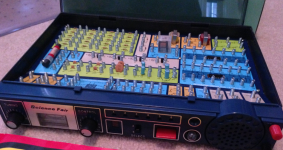You are using an out of date browser. It may not display this or other websites correctly.
You should upgrade or use an alternative browser.
You should upgrade or use an alternative browser.
SandSpur Fuzz biasing?
- Thread starter MichaelW
- Start date
giovanni
Well-known member
Not really, they didn't do that in Italy at all. I did have an internship right before I graduated which was cool, but also not a lot of hands on experience (I was working on near field measurements for a radar antenna so it was all coding). I learned to solder a few years later when a friend introduced me to pedal building.Serious question for folks that studied EE: Did you have practical labs that involved working with components (either solderless breadboard or actual soldering), or was the entirety of instruction theoretical?
Robert
Reverse Engineer
giovanni
Well-known member
I can connect to wifi! It's the cable with the roundy plug right?When I worked on the base that's how it was... None of the engineers had a clue what they were doing.
They could have probably spouted off some nice formulas back in their prime, but can't figure out how to connect their phones to WiFi now.
Coda
Well-known member
The first 2 years of most 4 year degrees is heavy on physics and calculus.
I love physics. As a kid, I always loved science. But as the science became more complicated, and math dependent, I wasn’t able to keep up. I have a fundamental mathematical reason malfunction. I never learned the multiplication table passed 6, and was once told in 4th grade than I couldn't return to my seat until I solved the division problem in the board…I stood there for an hour or so…until it was time for lunch…
When I was in college I took a Fundamentals of Physics course. It was 102, which was the good stuff: electrics, lenses, magnets…none of that fulcrum/lever/physical science bullshit. I ran that class. I could tell you the whole history of Faraday and Kelvin, and explain in detail how Einstein’s relativity theories worked, as well as the history of how they were developed. When it came time to prove it all with math, I tanked…
A decade and one MA in History later, now I’M the Professor…but don’t ask me to explain my grading rubric…
Robert
Reverse Engineer
I like math but I'm not very good at it anymore because I never use anything but the basics and ohms law.
A couple years ago I hunted down and bought all of the books that would have been involved in an electronics course so I could refresh myself on my own time, no deadlines, no teachers breathing down my neck, no idiot classmates...
I flipped through a Calculus book, nope, back up some. College Algebra.... nope.. back up some more.
At some point I was finding least common denominators and realized how far I had regressed.... I think it's more frustrating to look at this stuff and know that I used to be able to work it out.
A couple years ago I hunted down and bought all of the books that would have been involved in an electronics course so I could refresh myself on my own time, no deadlines, no teachers breathing down my neck, no idiot classmates...
I flipped through a Calculus book, nope, back up some. College Algebra.... nope.. back up some more.
At some point I was finding least common denominators and realized how far I had regressed.... I think it's more frustrating to look at this stuff and know that I used to be able to work it out.
spi
Well-known member
Yes, in college we did breadboard some circuits, including an 8 bit microprocessor. That was a spaghetti mess but it worked. Makes debugging a pedal trivial in comparison.Serious question for folks that studied EE: Did you have practical labs that involved working with components (either solderless breadboard or actual soldering), or was the entirety of instruction theoretical?
I learned soldering in a HS electronic shop class, and in that class we built a working multimeter kit.

